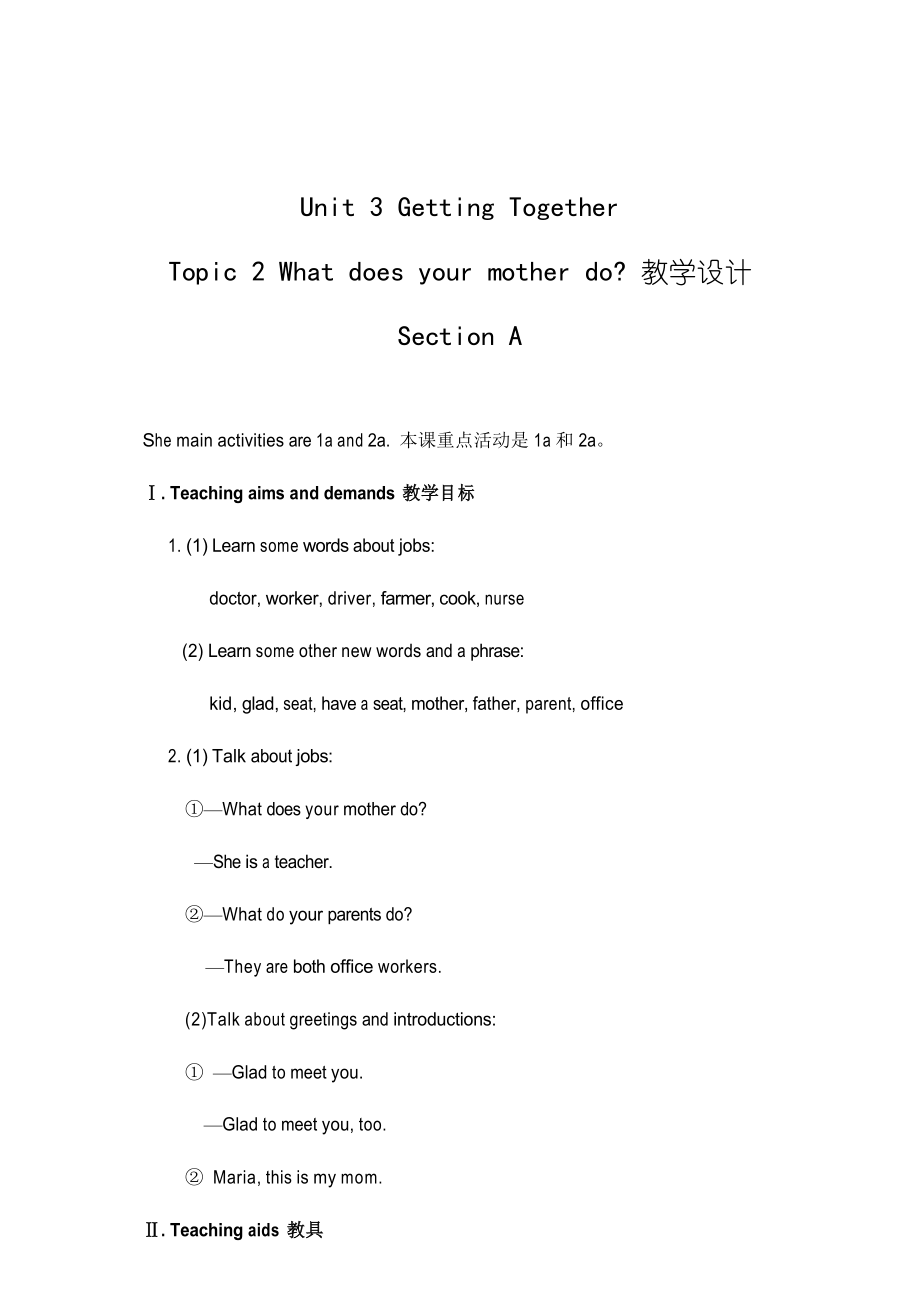《仁愛版英語七年級上冊Unit3 Topic2 SectionA教學(xué)設(shè)計(jì)》由會員分享��,可在線閱讀����,更多相關(guān)《仁愛版英語七年級上冊Unit3 Topic2 SectionA教學(xué)設(shè)計(jì)(15頁珍藏版)》請?jiān)谘b配圖網(wǎng)上搜索。
1����、Unit 3 Getting TogetherTopic 2 What does your mother do? 教學(xué)設(shè)計(jì)S ection AS he main activities are 1a and 2a. 本課重點(diǎn)活動是 1a 和 2a�。. Teaching aims and demands 教學(xué)目標(biāo)1. (1) Learn some words about jobs:doctor, worker, driver, farmer, cook, nurse(2) Learn some other new words and a phrase:kid, glad, seat, have a
2、 seat, mother, father, parent, office2. (1) Talk about jobs:What does your mother do?She is a teacher.What do your parents do?They are both office workers.(2)Talk about greetings and introductions: Glad to meet you.Glad to meet you, too. Maria, this is my mom. Teaching aids 教具名詞卡片/人稱代詞卡片/圖片/教學(xué)掛圖/錄音機(jī)
3�、/幻燈片/小黑板. Five-finger Teaching Plan 五指教學(xué)方案Step 1 Review 第一步復(fù)習(xí) (時(shí)間:10 分鐘)通過做游戲和師生問答等形式,復(fù)習(xí)上個(gè)話題的重點(diǎn)知識��,并導(dǎo)入新課�����。1. (問答游戲。復(fù)習(xí) Do you like ? 句型及答語�����。)(1) 把學(xué)生分成六人一組�����,每組準(zhǔn)備七�、八張名詞卡片。(2) 第一個(gè)學(xué)生先抽一張卡片����,其他學(xué)生一起問:Do you like ? 讓這位學(xué)生 用 Yes, I like it a little/a lot/very much.或 No, I dont like it at all.來回答。(3) 小組內(nèi)每個(gè)學(xué)生輪流問答一次后
4��、���,游戲停止��。T: Boys and girls, lets play a game: Ask and Guess.2. (教師出示人稱代詞卡片����,讓學(xué)生以“接龍”形式用教師呈現(xiàn)的人稱代詞造句。) T: Nice work! Now please look at these cards. Please use these words to makesentences one by one.Example:T: meS : He often helps me.1T: theyS : They are teachers.2T: sheS : She is my friend.3(換成學(xué)生持卡片�,教師造
5、句子�����,導(dǎo)入新句型�。)S : you4T: What do you do? (教師講解。)S s: We are students. (幫助學(xué)生回答�。)T : (指著一個(gè)男/女生) What does he/she do?Ss: He /She is a student.(板書學(xué)習(xí)新句型,并要求學(xué)生掌握�����。)What does he/she do?He /She is a student.T: Do you want to know more jobs? Lets come to the new lesson. (導(dǎo)入新課)Step 2 Presentation 第二步呈現(xiàn)(時(shí)間:13 分鐘)通過
6�����、展示圖片���、師生問答和分角色表演等形式,初步呈現(xiàn)新單詞及新句型���。 1. (出示 1c 圖片�����,教授關(guān)于職業(yè)的新單詞�。 )T: Look at Picture 1. What does he do?Ss: Hes a driver. (教師幫助學(xué)生回答。)(板書并要求掌握����。)driverT: Look at Picture 2. What does he do?Ss: Hes a farmer. (教師幫助學(xué)生回答。)(板書并要求掌握����。)farmer(以同樣的方式,出示圖片�,學(xué)習(xí)新單詞 cook, nurse, office, worker, doctor。并 要求學(xué)生掌握���。提醒學(xué)生注意 an of
7�����、fice worker���。)2. (讓學(xué)生聽 2 錄音,跟讀�,并注意語音語調(diào)。)T: Please listen to the tape and repeat. Pay attention to the pronunciation and intonation.3. (學(xué)生兩人一組,運(yùn)用 1c 的圖片��,練習(xí) What does he/she do? He /She is a/an 句型����,完成 2。)T: Please practice in pairs using the pictures in 1c . Then Ill ask several pairs to act out in the
8�、front.4. (師生問答,自然過渡到 1a 的教學(xué)���。)T: Nice work! Boys and girls, we learnt so many jobs just now. Do you want to know Kangkangs families and their jobs?S s: Yes.T : Please follow Maria, Jane, Michael to Kangkangs home.(呈現(xiàn) 1a 的教學(xué)掛圖��,向?qū)W生們介紹�。)T: Look at this picture. This is Kangkangs mother. The four kids ar
9�����、e Maria, Jane, Michael and Kangkang.(板書并要求學(xué)生掌握��。)mother, kidT: What does Kangkangs mother say to the kids?S s: Glad to meet you.T : Good! Then how do the kids reply?Ss: Glad to meet you, too.(板書����,教學(xué)新單詞及新句型,并要求學(xué)生掌握�。)gladGlad to meet you.Glad to meet you, too.T: These kids a re standing at Kangkangs hom
10、e. Do you know how to say“ 就 座”in English?Ss: Have a seat. (教師幫助學(xué)生回答�����。)(板書并要求學(xué)生掌握��。)seat, have a seat5. (教師放 1a 錄音���,讓學(xué)生跟讀并注意語音語調(diào)�����。)T: OK. Please listen to the tape and read after it. Pay attention to the pronunciation and intonation.6. (教師設(shè)置一個(gè)場景 At Kangkangs home.)T: Suppose you are at Kangkangs home. L
11�����、ets role-play.(教師和四個(gè)學(xué)生合作�����,示范表演 1a 對話�,之后學(xué)生五人一組操練��,教師巡回 指導(dǎo)�����,挑兩組比較出色的上臺表演。完成 1b���。)7. (根據(jù) 1a 的教學(xué)掛圖�,過渡到 1b��。)T: Look at the picture. Kangkangs mother welcomes the kids at Kangkangs home. What do Kangkangs parents do? Do you want to know?(板書并講授 parent(s)的含義�����,引出 father����,要求學(xué)生掌握。)mommotherdadfathermother or fatherp
12�����、arentmother and fatherparentsStep 3 Consolidation 第三步鞏固(時(shí)間:7 分鐘)通過聽錄音回答問題��、填空以及分角色朗讀�����、填寫表格等形式,使學(xué)生在運(yùn)用 中進(jìn)一步掌握新單詞和新句型��。1. (教師播放 1a 錄音����,要求學(xué)生根據(jù)錄音回答問題���。)T: Please listen to the tape and answer the question:What do Kangkangs parents do?(核對答案�����。)2. (再放 1a 錄音���,要求學(xué)生根據(jù)錄音填空,教師將聽力問題用幻燈片呈現(xiàn)出來�。) T: Listen to the tape again
13、 and fill in the blanks on the slide.Kangkang, what does your do?She is a .And your father?He is a . Michael, what do your do?They are office workers.(核對答案后分角色朗讀 1a��,然后四人一組操練����。完成 1a-2。) T: Read 1a-2 in roles. Then practice in groups of four.3. (讓學(xué)生獨(dú)立完成 1b���。)T: Read 1a again and fill out the table in 1b
14��、.(核對答案����。)4. 聽 2 中的對話,選擇合適的詞語完成短文填空���。5. 先放 3a 中的錄音�����,然后跟讀各個(gè)單詞的發(fā)音�。6. 小組合作�����, 勾出 3b 中聽到的單詞���,相互檢查核對答案�����。Step 4 Practice 第四步練習(xí) (時(shí)間:8 分鐘)通過 “職業(yè)競猜 ” 游戲�����、師生和生生問答等形式���,使學(xué)生熟練掌握新單詞和新句 型����。1. (做“職業(yè)競猜”游戲�,使學(xué)生在表演中熟悉職業(yè)名稱�����。)T: Lets play a guessing game.(1)(活動過程:)1 (教師事先制作寫有職業(yè)名稱的卡片�����。如:teacher, worker, doctor, cook, driver 等�����。)2 (活動前教
15�、師作一次示范:教師隨意抽取一張卡片(如 teacher),并根據(jù)卡片 上寫的職業(yè)����,做一個(gè)能代表該職業(yè)的動作 (表演啞劇���,假裝在黑板上寫字,或 拿著書來回踱步等����。)然后示意學(xué)生舉手猜出該職業(yè)。學(xué)生若不能猜對����,可以 提問,但教師只能用 Yes 或 No 作答���。)例如:S : Are you a doctor?1T: No.S : Are you a teacher?2T: Yes.(學(xué)生猜對教師示范的職業(yè)后����,教師退出活動����,同時(shí)讓猜對的那個(gè)學(xué)生上臺抽卡、表演和回答問題�,下一個(gè)猜對者接著上臺抽卡,以此類推。)(2)(有關(guān)說明:)1 (每次提問次數(shù)和猜測次數(shù)應(yīng)有所限制��,在規(guī)定次數(shù)內(nèi)仍未猜對��,則可進(jìn)行 下
16�����、一輪競猜�。)2 (本活動也可采用兩組對抗形式,即一組派代表抽卡片表演���,另一組猜職業(yè)。 雙方輪換角色��,最后猜對次數(shù)多���,準(zhǔn)確率高的一組獲勝��。)2. (教師出示各種職業(yè)人士的圖片和學(xué)生進(jìn)行對話練習(xí)���,操練 What do/does do?)T: What do you do?Ss: Were students.(教師按照圖片依次問學(xué)生。)T: What does the man do?S :He is a driver.3T: What does she do?S :She is a doctor.4T: What does the man do?S :He is an office worker.5
17�����、(教師應(yīng)提醒學(xué)生注意此句中 an 的用法并板書。)He is an office worker.3. (教師把圖片分給各小組��,小組內(nèi)每人輪流模仿老師提問其他學(xué)生����,讓每一位 學(xué)生都有機(jī)會說英語。然后各組交換圖片�,進(jìn)行對話練習(xí)。)T: Please ask and answer in groups using these pictures.Step 5 Project 第五步 (時(shí)間:7 分鐘)Homework:(1)學(xué)生采訪自己的爸爸或媽媽�,然后寫一篇短文介紹他們工作的具體情況。鼓勵(lì)學(xué)生在作業(yè)紙上畫一張父親(母親)的畫或貼一張父親(母親)的照片�。下節(jié) 課向全班宣讀。(2)準(zhǔn)備一個(gè)硬紙板�����,剪成圓形的��,直徑 10cm�,制成一個(gè)轉(zhuǎn)盤,下節(jié)課用����。 板書設(shè)計(jì):What does your mother do?Section AAn office workerGlad to meet you.Please have a seat.What do you do?Im a (an)What does do?They are both office workers. He /She is a (an)
 仁愛版英語七年級上冊Unit3 Topic2 SectionA教學(xué)設(shè)計(jì)
仁愛版英語七年級上冊Unit3 Topic2 SectionA教學(xué)設(shè)計(jì)

